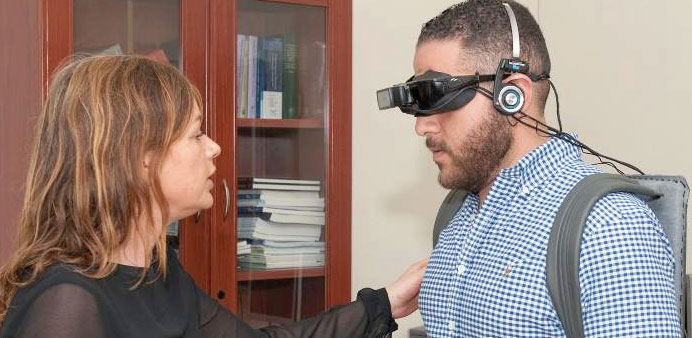Hamad Medical Corporation’s (HMC) Psychiatry Department has introduced an innovative tool to train its doctors to enhancing the treatment and care of patients experiencing psychosis.
Psychosis is a symptom or state of mind that occurs as a result of other conditions. It is often linked to mental illnesses such as schizophrenia, bipolar disorder or severe depression.
The tool to assist in the treatment of psychosis is called Labyrinth Psychotica. It was developed as part of a practice-based PhD project by Netherlands-based artist Jennifer Kanary, to investigate in more depth what it is like to experience psychosis.
The project aims to give healthcare providers and other target audiences the opportunity to gain a unique insight to increase empathy and understanding that will in turn contribute to better quality of care for people with this condition.
“Labyrinth Psychotica is well-established in Europe and is now being introduced for the first time in Qatar. We are using it for the training of our doctors with the aim of enhancing treatment for patients experiencing psychotic episodes; including schizophrenic patients and some patients with severe depression and bipolar disorder, who may also experience psychosis,” said Dr Majid al-Abdulla, consultant psychiatrist and deputy chairman of the Psychiatry Department.
He noted that schizophrenia, severe depression and bipolar disorder are among the more severe illnesses diagnosed in patients at the Psychiatry Department. In addition, there are cases of patients with drug addiction who have developed psychosis.
The department provides a Substance Misuse Service as part of its wider mental health services.
The equipment, known as Wearable, is an augmented reality cinema that allows users to perceive their direct surroundings as if in psychosis.Through the Wearable, the doctors were able to enter the mind of a fictional character, a young woman called Jamie who is experiencing psychosis.
Through this, they can experience what she experiences, a ‘normal’ reality that gets increasingly distorted.
Each participant’s experience is different as the individual participant’s physical responses to the hallucinations determine how deep he or she enters into the psychosis.,Participants can be filmed and later review the footage.
Training on the use of this tool is expected to be delivered to approximately 60 doctors at the Psychiatry Department. The activity was facilitated by Dr Ehsane Mohsen Gad, HMC psychiatry consultant; Alexandra Landre and Natasja Van der Horst, project managers of Labyrinth Psychotica; and Katia El Masri, medical representative for the Janssen Pharmaceutical Companies of Johnson & Johnson, which financially supports the project.

HMC Psychiatry Department doctors experience the Wearable.
